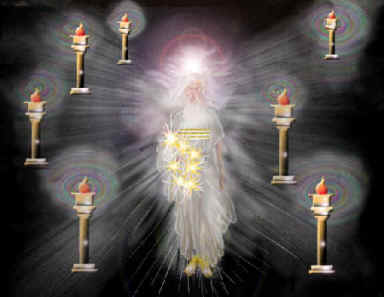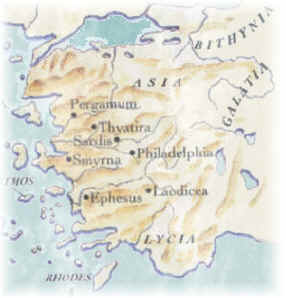
| 1 |
2 |
3 |
4 |
5 |
6 |
7 |
| Ephesus |
Smyrna |
Pergamos |
Thyatira |
Sardis |
Philadelphia |
Laodicea |
| "First,
Desirable" |
"Bitter
Affliction" |
"Earthly
Heighth" |
"Sacrifice
of Labor" |
"Prince
of Joy" |
"Love
of A Brother" |
"Just
People" |
| 33-70 AD |
70-313 |
313-1157 |
1157-1367 |
1367-1517 |
1517-1874 |
1874-? |
Paul
35-64 AD |
John
70-100 |
Arius
313-336 |
Waldo
1157-1217 |
Wycliffe
1367-1384 |
Luther
1517-1546 |
Russell
1874-1916 |
| 7
Golden Candlesticks |
First
& Last,
Dead and Alive |
Sharp
2-Edged Sword |
Eyes
like Fire,
Feet like Brass |
Livest
and
Art Dead |
Key
of David |
Amen,
Faithful & True
Beginning of Creation |
| Left
1st Love |
Synagogue
of Satan |
Antipas |
Jezebel |
Come
as Thief |
Hast
Little Strength |
Lukewarm |
| Nicolaitanes |
Tribulation
10 Days |
Balaam
& Balac,
Nicolaitanes |
Depths
of Satan |
Defiled
Garments |
Keep
from Hour of Temptation,
Hold Fast Crown |
Gold
Tried,
White Raiment Eyesalve,
Knock at Door,
Sup with Him |
| Tree
of Life |
Crown
of Life,
Not Hurt of 2nd Death |
Hidden
Manna
White Stone,
New Name |
Rod
of Iron,
Potter's Vessel
Morning Star |
White
Raiment,
Confess Name to Father |
Pillar
in Temple,
Name of God, New Jerusalem, & New Name |
Sit
in Christ's Throne |
For more detail, click on
individual Church name.

STORY OF THE
SEVEN CHURCHES
The Book of Revelation contains the story of
the "seven churches."
While the story is history for the most part, it was prophetic, written
in advance to prepare the saints for their trials. The Lord Jesus knew the experiences
each stage of the church would have. He sent a message to the angel of each church
to prepare the saints.

Jesus
sent a message to the angel
of each of the seven churches. |
What did the angels do?
In Revelation 8:6 we are told: "And the seven angels which
had the seven trumpets prepared themselves to sound."
The "angel" of each "church" had a
"trumpet." When he received his message from Jesus Christ, the duty of the
"angel" of each "church" was to deliver his message by blowing a
"trumpet."
We are not told what the "trumpet" messages were. We are only
told what followed when the "trumpet" message was delivered. Each message was
given to prepare the faithful of each period to endure the trials and circumstances that
would be peculiar to their time and place.
To illustrate, Jesus delivered a message to Israel. The Gospel tells
us what happened when Jesus and his disciples preached in Israel. Few people, some 500,
became his disciples. Many others thought Jesus was a prophet and a good man.
The religious leaders found themselves exasperated with Jesus, who was
neither a priest nor a Levite, and who had no credentials they could identify. Yet, Jesus
assumed the role of a great religious teacher.
The religious leaders found themselves hating Jesus and wishing to kill
him. He threatened their authority, and that made their blood lust run high. The things
that happened while Jesus preached, or trumpeted his message, are very similar to what
happened when each of the seven messengers blew his trumpet.
Each message delivered by a trumpet was an action. The events
that transpired, once the trumpet message was given, became a reaction.
The "seven churches"—who are they?
What do you think when you read about any one of the "seven
churches"? Do you think each church contained only saints? Did it include some
unfaithful Christians? Did it include any "tares"? Did it include some of the
second death class?
The Greek word ecclesia means—"a called-out
people." All who respond to being called out of the world would constitute
the church. Some in the church are faithful to their calling and can be called
saints.
Others, less faithful, at least for a time, may be considered the Great Company.
Most of those in the church would probably be "tares,"
the planting of Satan, although in times of persecution there would be fewer
"tares."
When Christianity became popular, the "tares" became the
overwhelming majority. Not having the Lord’s Spirit, "tares" are
unresponsive to the whole truth. They outnumber the spirit-begotten and become a powerful
block within the church, hindering and obstructing what the holy Spirit is endeavoring to
accomplish. The fourth class are the "wolves in sheep's clothing,"
the servants of Satan who entered the church to feed upon the flock.
The
"wolves" are identified in 2
Corinthians 11:13-15:
"For such are false apostles, deceitful workers, transforming themselves
into the apostles of Christ.
"And no marvel; for Satan himself is transformed into an angel of light.
"Therefore it is no great thing if his ministers also be transformed as
the ministers of righteousness; whose end shall be according to their works."
The message to each of the churches, which is always given
through an "angel," represents a general condition pervading in the church.
It does not tell you what each individual saint in each church is doing. However, the
general condition will have an enormous effect on the saints. If they can understand what
is happening in their time and place, it enables them to discern more clearly the way they
must take.
Those who are not alert and responsive to the Spirit's instructions
will find themselves hindered and weakened. The "tares" may find the
"angel’s" message disruptive and respond in kind. The "wolf"
leaders will be outraged with the truths being proclaimed in their time, even as they were
in Jesus' time.

The Apostle John
|
John
received the visions of Revelation while exiled on the Isle of Patmos. He was very old,
but still keen of mind and had total recall of the visions.
We do not know whether he was naturally so gifted with memory or
whether the Lord impressed these visions so forcefully in his mind that he would not
forget the details.
We think it was a combination of both his natural gifted memory and the
power of the holy Spirit that made John such a perfect tool for the Master’s use.
John wrote his Gospel and his epistles in his old age.
We see no conflict with him also writing the most dramatic book of the
Bible—the Revelation of Jesus Christ.
|

Apostle John on the Isle of Patmos
John had an artist’s eye
for detail. Therefore, we must pay attention to the details. |
Every time the devil imprisoned the saints, it resulted in
greater blessings coming to the church. Paul’s imprisonment enlarged
his ministry by not limiting his influence to the local churches personally, which would
soon be lost or become twisted and fuzzy.
When Paul was imprisoned, he addressed the churches in a most
excellent and enduring way. Nearly two thousand years have passed since Paul's mighty pen
was laid down in death, but oh, the power of his writings!
So it was with John’s imprisonment and exile. The most powerful
message of the Bible has come down to us through the ages with all its force and vitality
undiminished.

The Seven Churches
It is alleged by history that John was later freed from
Patmos and that he personally visited the "seven churches of Asia."
This
would have been a total circuit of about 235 miles.
Revelation 1:9 indicates this, saying, "I John … was
in the isle that is called Patmos," as though he had since left. If that
were true, the Revelation message reached each of the literal churches in some form at
that very time. Either way, the natural churches served to picture the seven stages
of the Gospel Church.
If Ephesus pictured the church of Paul’s day, John’s message
came a little too late. However, when the message was to be delivered to the
"angels" is not mentioned. Like any play, the message could reach back in time
as well as into the future.
Paul, who had visions and revelations more abundant than the other
apostles, was, therefore, able to deliver his "trumpet" message to the Ephesus
church. The Revelator takes the reader back before the "Lamb" was slain in this
narrative, so we see how stories may reach back as well as forward with equal ease.
Click to go to the following:
Topical Studies on:
7 Churches Topical Study Home Page
Ephesus - Smyrna - Pergamos - Thyatira - Sardis - Philadelphia - Laodicea
Chapter/Verse by Verse Studies on:
7 Churches Verse by Verse Home Page
Ephesus - Smyrna - Pergamos - Thyatira - Sardis - Philadelphia - Laodicea
Topical Study Home Page - Chapter Study Home Page
- Sinaitic Manuscript - Questions - Glossary.
E-Mail
Day7000@sbcglobal.net with comments.
Copyright 2001 John Class
|